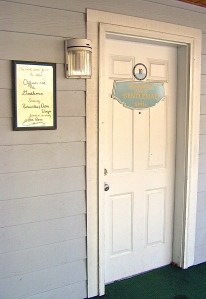A few years ago, I signed up for guitar lessons. To learn my way around an acoustic was something I'd wanted for pretty much my whole life. I showed up to class every Monday evening and dutifully practiced every day. I loved it. I was awful, I knew it, and I didn't care. The day I was able to strum Cat Stevens' Wild World without hesitating over chord changes was one of the most gleeful of my life.
But I quit those lessons after a couple months. The instructor. I think I was causing him actual physical pain. I was the only true beginner in a beginner's class and everyone just blew right past me. So I shrugged, set the guitar aside, and decided that one day, I'd find someone who was interested in teaching someone like me—earnest, with short, stubby fingers.
Late February, the Seattle-based alternative weekly newspaper The Stranger printed a piece by author Ryan Boudinot, Things I Can Say About MFA Writing Programs Now That I No Longer Teach in One, and the internet blew up, at least those bits writers pay attention to. Several brilliantly-worded rebuttals have been penned in the intervening days, and I'll include links to a few of those at the end.
I could rant about Mr. Boudinot's silly conjectures on the nature of talent, or the age one must begin writing in order to achieve "success", or his revolting remark,"Just because you were abused as a child does not make your inability to stick with the same verb tense for more than two sentences any more bearable. In fact, having to slog through 500 pages of your error-riddled student memoir makes me wish you had suffered more." (Yes. Yes, he did). Yet what upsets me most is the attitude of entitlement and exclusivity that pervades this piece, that the act of writing belongs only to the most gifted and Mr. Boudinot should not have had his time wasted by the hapless.
Mr. Boudinot does make some salient, if not terribly original, points: Writers must write a lot (and not make excuses why they cannot); they must read a lot; they must work very, very hard, and expect obscurity; they must write authentic prose; and the publishing industry is really different than it was several years ago. Boom. Now you know.
I trust most MFA faculty do what they should: instruct and guide, rather than smirk at and bemoan the talentless or anoint the rare "Real Deals", as Mr. Boudinot refers to the handful of MFA students he taught over the years whose prose he could celebrate, rather than merely stomach. The profession of creative writing instruction is better for seeing the backside of Mr. Boudinot.
A few days after the Boudinot Debacle, another discussion unrolled in an online group of writers, this time about an interview with literary agent Chris Pariss-Lamb, The Art of Agenting, and his comment:
I frankly think that initiatives like National Novel Writing Month are insulting to real writers. We don’t have a National Heart Surgery Month, do we? ... I would argue that it takes as much time and work to perfect their craft, in addition to having talent to begin with that most people just don’t. What I really object to is this notion behind these initiatives that anyone can write a novel, and that it’s just a matter of making the time to do it. That’s just not true.
Okay. Here's the thing. I agree 100 percent with this statement. Except when I don't. I have never participated in National Novel Writing Month (NaNoWriMo)—the November event that encourages people to pen 50,000 words of a rough draft from November 1-30—and can't see that I ever will. But does that mean I find it insulting (assuming of course that I'm a "real writer")? Does that mean I have the right to pass judgment on how others find and express their writing voice? Was Jimmy Page pissed off that I was butchering Peter, Paul and Mary because my feeble attempts belittled his years of practice? Did I actually think what I was doing was easy, just because I had a guitar? Seriously?
NaNoWriMo might have as much to do with writing a novel as the Runner's World Run-a-Mile-a-Day-for-30-Days challenge has to do with training for a marathon, but that's not the point. The point of NaNoWriMo is to commit to the act of writing, perhaps giving a story a chance to take purchase in one's otherwise-distracted mind and busy life. It is a celebration of effort, a jubilation of creation.
Critics contend NaNoWriMo gives the impression that writing a novel is easy, if you can just crank out 1,667 words a day. Of course, no one understands what it takes to write a novel if they haven't put in the years of writing and revising and collecting rejections (the latter being an integral part of the writing process), and if the amazing happens—the book deal—all the work of revising and promotion that follow. But the Special Snowflake approach to writing—that no one really understands how hard it is unless they are the Real Deal or a Real Writer—oh, get over yourself.
Someone commented that we don't want/need more people writing novels. Fie on that. We want more people writing, painting, plucking out terrible renditions of Somewhere Over the Rainbow on a guitar. We want more people thinking creatively, telling stories, dreaming. It's the rare few who take it all the way past dream and hobby to send their work into the world, fewer still who find their way past the gatekeepers and into the realms of a profession. The "Real Deals" are those who show up to the page, day in and day out, despite lousy teachers and naysayers, despite the competition. The "Real Deals" make room at the table for all. Even those lumbering in with guitar cases in hand.
“To hell with facts! We need stories!” ― Ken Kesey
- Those Who Teach, Can: A Formal Reply to Ryan Boudinot's Post on Teaching A thoughtful, compassionate and cogent response by writer and creative writing teacher Laura Valeri
- An Open Letter to that Ex-MFA Creative Writing Teacher Dude wherein Chuck Wendig pees bees.
- On Ryan Boudinot and the Goddard MFA Bhanu Kapil, requesting a formal apology from her former Goddard College colleague (where Ryan suffered all those years of teaching)



